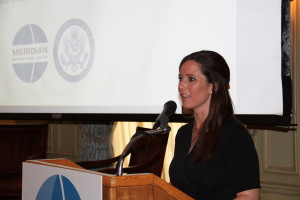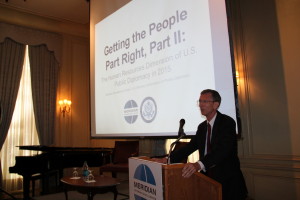A rebuilding economy, spreading democracy, developing technologies, a changing political environment: it is a time of transformation for the United States government. As the U.S. handles its own domestic responsibilities, it is working concurrently to improve its reputation abroad. Certainly now is the time to build new relationships, strengthen those already existing, and take advantage of the space this country chooses to give diplomacy in its international activity.
It is becoming clear that reassessing the way the U.S. approaches Public Diplomacy (PD) from an institutional level could set us further on the path to success. In partnership with Katherine Brown and Chris Hensman from the U.S. Advisory Commission on Public Diplomacy, and funded by a grant from the Smith Richardson Foundation, Ambassador Wohlers has done just that. As he searched for a way to fit the pieces of public diplomacy back together, he sought to answer the question: What can the U.S. Department of State do to improve PD’s effectiveness? Ambassador Wohlers presented his research and report entitled Getting the People Part Right II this past Wednesday, June 17th, at Meridian International Center, followed by an engaging and thoughtful discussion with President and CEO of Meridian, Ambassador Stuart Holliday.

Ambassador Wohlers presented several recommendations to elevate the effectiveness of the Department of State, the first of which, and arguably the most important: to define public diplomacy’s mission and priorities in concrete and tangible terms. Ambassador Wohlers also suggested strengthening the oversight role of the Office of Policy, Planning, and Resources for Public Diplomacy and Public Affairs for all PD related issues. Improving training programs, identifying relevant skills and attributes, and increasing targeted recruitment of professionals were also on Ambassador Wohlers’ list of recommendations for the Department of State.

The recommendations coming from Getting the People Part Right II are hopeful, and show concrete steps that can be taken to improve U.S. PD. But as Ambassador Wohlers demonstrated, simply showing PD’s value is an extremely complex task. Improvement will require a shift in the entire surrounding mindset – people have to “take PD seriously” in his view, and believe that it can make a difference. It is a field with no time frame, which connotes vagueness and lack of direction to some, but could also be seen as an opportunity to make timeless, lasting strides in international relationships. But how will we make that shift in thought?
PD is an invaluable tool that we could rely on during this time of worldwide transformation – we just need to figure out how to use it effectively. But to do that, we need interest, curiosity, and excitement, which we seem to be lacking. In another ongoing Meridian project, Foreign Policy Matters, we explore this issue of mindset by showing the effects foreign policy can have on the daily lives of Americans. Ambassador Holliday admits that foreign policy can seem “distant and far removed,” but urges people to recognize that in reality, “foreign policy impacts every aspect of our lives.” The same is true for public diplomacy; it has the power to affect us all. It lays the foreign policy groundwork – through it, we create the relationships that allow for international collaboration and progress. To this end, both State and other government officials – as well as the citizens who give them their mandate – should be making PD a top priority.
The success of U.S. public diplomacy depends heavily on the support given to its professionals, and the environment surrounding them. Meridian works to continue to set an example for diplomacy and help create this environment through exchange programs designed to foster cross-border understanding, in the hope that it can be a driving force in furthering goals for international leadership. As a mechanism for strengthening U.S. engagement with the world, looking ahead to a global future, and promoting international collaboration, public diplomacy is at the heart of Meridian’s mission. A revamped PD system may just be the tool the United States needs to successfully connect with communities and countries around the world, as long as we put our trust in its effectiveness. With further collaboration, we will move closer to answering these questions, and I ask one more: What will be the next step for public diplomacy?















